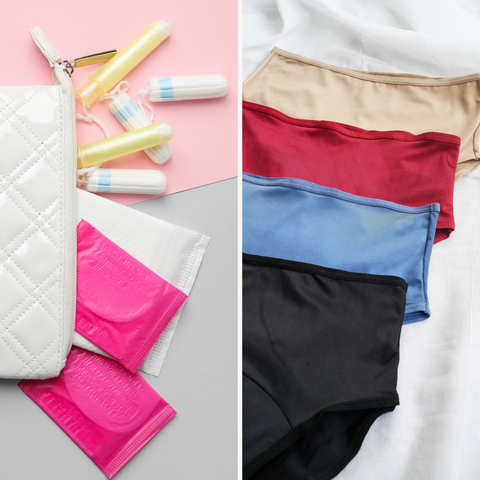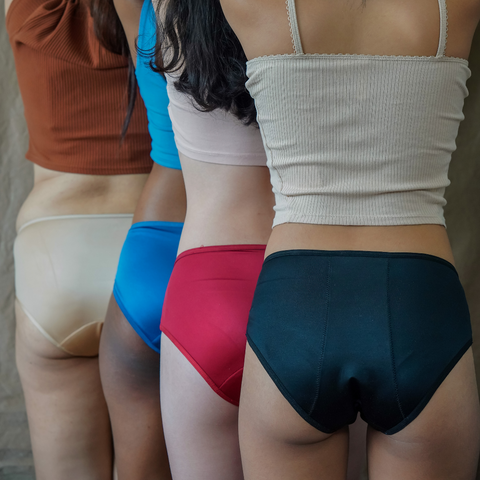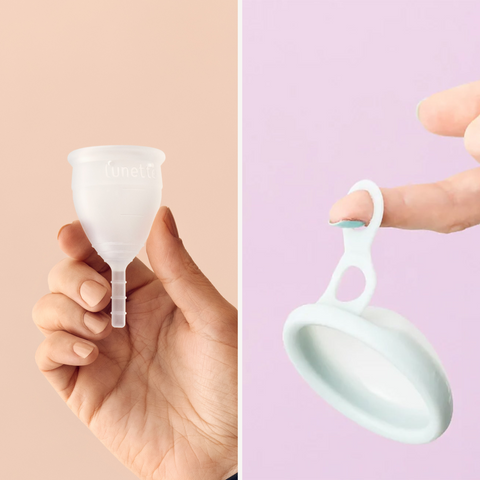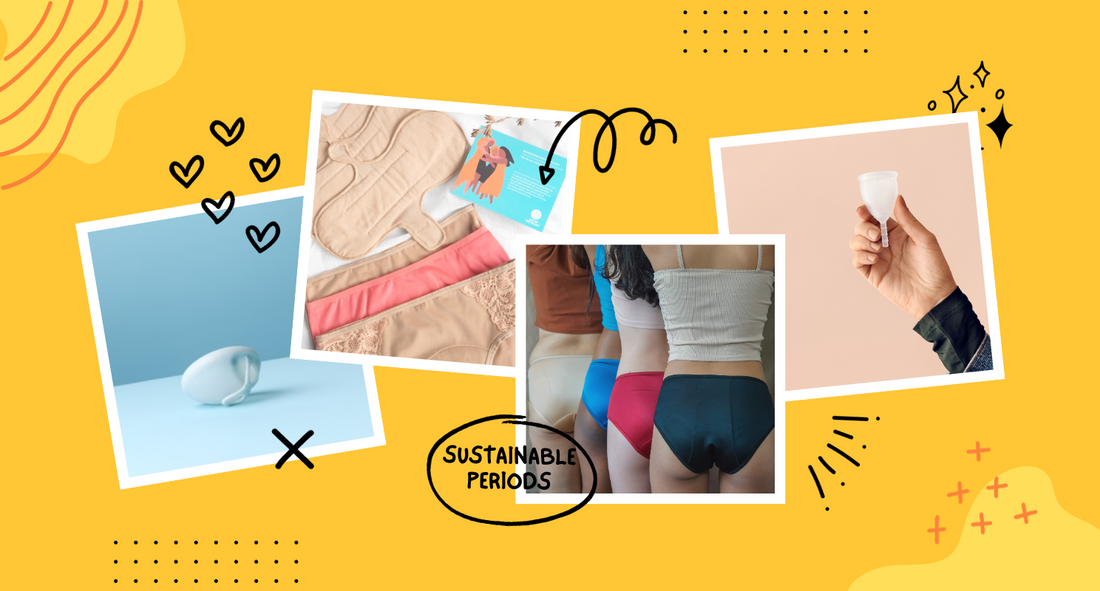The subject of menstruation has long been shrouded in shame, secrecy, and cultural taboos. As people who menstruate, we have been conditioned to feel shame and embarrassment about a natural bodily function. But times are changing, and we are seeing a significant shift in the way society views and discusses menstruation. As people become more educated and aware, the narrative is changing, and menstrual health products are evolving to meet the needs of individuals. Sustainable period products are gaining popularity, not only benefiting the environment but also redefining menstruation and empowering people who menstruate to make choices about their bodies.
Overcoming Shame & Stigma Around Periods
For generations, periods have been a taboo subject, something that should be kept secret and not talked about in public. This has led to a culture of shame and embarrassment around menstruation (and the menstrual cycle), with many people feeling uncomfortable discussing their periods even with their closest friends and family members.
Fortunately, in the Philippines and some countries in Southeast Asia, this stigma is slowly beginning to break down. Menstruators are speaking out about their periods, and there is a growing movement towards menstrual equity, which seeks to ensure that all people who menstruate have access to the products and resources they need to manage their periods.
The Campaign for a Greener Flow: Traditional vs Sustainable Period Products
Most traditional period products, such as pads and tampons, are made from a combination of synthetic materials like plastic and cotton. These products are designed to be disposable, which means they end up in landfills (or worse, our oceans) and can take 500-800 years to break down.
Not only do these products take a toll on the environment, they can also be harmful to our bodies. Many traditional period products contain chemicals and toxins that can be absorbed into our bodies through our skin, leading to a range of health problems.
Thankfully, there are now a wide variety of eco-friendly alternatives to traditional period products that offer a more sustainable and healthier option. These products are made using natural materials like organic cotton, bamboo, banana, and are designed to be reusable and/or biodegradable.

Empowering Individuals through Choice & Freedom
One of the biggest benefits of sustainable period products is that they empower individuals to make choices about their bodies. With sustainable period products, people with periods have the freedom to choose products that work best for them. Whether it’s period underwear, menstrual cups, cloth pads, or biodegradable pads or tampons, there are a variety of options available that can be tailored to an individual’s needs and preferences.
A Closer Look at the Innovations & Trends of Sustainable Period Products
Period Underwear
One of the most popular sustainable period products is period underwear. These specially designed leakproof underwear have built-in absorbent layers that can hold up to 20 ml or about 4 teaspoons worth of blood, depending on the brand and model. This means that they can be worn for longer periods of time without needing to be changed. These innovative products are comfortable, easy to use, and can be washed and reused again & again, eliminating the need for single-use products. Because they are also designed to be leakproof, we can go about our daily activities without worrying about unwanted leaks.
Our favorite period underwear: Lily of the Valley, of course!
Our signature period underwear is highly rated for fit, comfort, and quality. Lily of the Valley uses 100% cotton lining and a bamboo core to absorb the menses.
Our patented period underwear for winged pads are also great for increasing comfort and security for people already using cloth pads, menstrual cups, or biodegradable pads.
Other brands available in the Philippines: Mirko, HerPeriod

Reusable Menstrual Cups & Menstrual Discs
Another sustainable period product that is gaining attention is the menstrual cup. These small, flexible vessels are made from silicone or rubber and are designed to be inserted into the vaginal canal under the cervix, create a leak-free seal, and collect menstrual blood. They are reusable, which means they can last for years, and can be worn for up to 12 hours before emptying, making them a very cost-effective period product option. It does take a few cycles of practice to learn how to effectively use them; but when you do, they are comfortable and convenient to use.
Menstrual discs, on the other hand, are smaller & flatter than menstrual cups, and are also inserted into the vagina to collect menstrual blood. These flexible discs sit behind the pubic bone without the need for suction. Some models have a higher capacity than menstrual cups, and can give people with heavier periods a longer wear time. However, removing a menstrual disc can be messier compared to a menstrual cup. With frequent use and practice, menstrual cups & discs are an eco-friendly option to disposable pads & tampons.
Our favorite menstrual cup: Lunette and Hello
Lunette menstrual cups are made from FDA-approved medical-grade silicone. They come in 2 sizes and a variety of fun colors.
Hello offers both menstrual cups and an award-winning menstrual disc that features a double-looped tab for easy removal.
Other brands available in the Philippines: Sinaya, Intimina

Cloth Pads, Biodegradable Pads & Tampons
Before the introduction of commercial period products during World War 1, people with periods used pieces of cloth to absorb menstrual blood. They were then washed and reused for the next menstrual cycle. Similarly, cloth pads are made using clothing fabric and natural material like cotton, bamboo, terry cloth, and can be washed & reused.
Other sustainable period products available that have become available include biodegradable and organic pads or tampons. These are typically made of natural and sustainable materials. Depending on the brand and product, the materials could include organic cotton, bamboo fiber, banana fiber, or wood pulp. They are highly absorbent and do not contain the same harmful chemicals as traditional pads or tampons. It's important to note that while these pads & tampons are biodegradable and organic, not all of them are compostable.
Our favorite organic pad: Nala Woman
Nala Woman biodegradable pads are made using organic cotton, without harmful chemicals like pesticides, perfumes, or bleach; making them good for the body as well as for the planet. This helps Nala pads prevent risks of irritation, itching, and allergies.
Other brands available in the Philippines: Halia, Cojo

Transitioning to Sustainable Period Products
If you’re interested in making the switch, or simply to start incorporating sustainable period products in your lifestyle, there are a few things you should keep in mind. First, it’s important to do your research and find products that work best for you. This may take some trial and error, but there are a variety of options available to suit different needs and preferences.
It’s also important to be patient with yourself during the transition period. Sustainable period products may take some getting used to, but with time and practice, they can become a comfortable and convenient part of your period management routine.
Embracing Choice & Empowering the Next Generation
As the demand for sustainable period products continues to grow, and as more people become aware of the environmental impact of disposable period products, we are foreseeing even more innovation and development in this area. Some of the trends we can expect to see in the future include more eco-friendly materials, improved designs, better choices, greater accessibility and affordability.
The rise of sustainable period products is about more than just protecting the environment – it’s about empowering individuals to make choices about their bodies, and breaking down the taboo and shame that has surrounded periods for far too long. By embracing sustainable period products, we can redefine menstruation and create a more positive and empowering experience for ourselves and the next generation.
Note: According to research, individuals who have access to water & laundry facilities can easily adopt reusable period underwear and cloth pads. However, for those who lack access to water & laundry facilities, menstrual cups and disposable products may be a more practical option. Additionally, it is crucial to acknowledge that marginalized and underserved groups, including indigenous people, people with disabilities, and people living in poverty, are disproportionately affected by this access issue. Efforts to address this issue should prioritize inclusivity and ensure equitable access to menstrual management products for all individuals.




